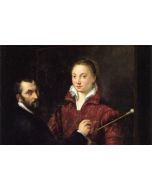Art, politics & culture in East and West Germany, and after the Reunification
This course will be delivered online. See the ‘What is the course about?’ section in course details for more information.
This course has now started
- Course Code: VB727
- Dates: 24/04/24 - 22/05/24
- Time: 18:30 - 20:30
- Taught: Wed, Evening
- Duration: 5 sessions (over 5 weeks)
- Location: Online
- Tutor: Irina Chkhaidze
Course Code: VB727
Duration: 5 sessions (over 5 weeks)
Please note: We offer a wide variety of financial support to make courses affordable. Just visit our online Help Centre for more information on a range of topics including fees, online learning and FAQs.
What is the course about?
In this 5-session course we will examine the artistic developments in Germany from the 1960s to now, and the impact of historical events such as the Second World War and the fall of the Berlin Wall. We will focus on the rise of performance, video and installation art in Germany, and the movements such as Conceptualism, Fluxus, Capitalist Realism and Neo-Expressionism, as well as the role of the Düsseldorf School of Photography. The course is structured around classroom lectures and discussions, finishing with the multi-media art of the 21st century. We will analyse the political and philosophical questions raised by the artworks and artistic currents in relation to the historical shifts.
This is a live online course. You will need:
- Internet connection. The classes work best with Chrome.
- A computer with microphone and camera is best (e.g. a PC/laptop/iMac/MacBook), or a tablet/iPad/smart phone/iPhone if you don't have a computer.
- Earphones/headphones/speakers.
We will contact you with joining instructions before your course starts.
What will we cover?
• An overview of prominent German artists and art movements from the 1960s to present. Some of the artists we cover include Joseph Beuys, Anselm Kiefer, Gerhard Richter, Sigmar Polke, Georg Baselitz, Rebecca Horn, Isa Genzken, Rosemarie Trockel, Andreas Gursky and Candida Ho¨fer.
• The impact of new art forms such as video, performance and installation art.
• The influence of historical events such as the Second World War and the fall of the Berlin Wall on art practices.
What will I achieve?
By the end of this course you should be able to...
• Identify at least three contemporary German art movements and describe the works by at least six artists.
• Evaluate the impact of new art forms on contemporary art practice.
• Demonstrate improved visual analysis skills and an ability to situate the key works of art discussed in a broader cultural context.
What level is the course and do I need any particular skills?
This course is suitable for all levels; however, basic acquaintance with the early 20th century art movements in Germany is desirable.
YYou should be able to follow simple written and verbal instructions, demonstrations, hand-outs and health and safety information as well as basic functions of Zoom, specifically microphone and camera.
How will I be taught, and will there be any work outside the class?
You will be taught with slide presentations, group discussions, and short group exercises. Reading materials will be available online/digitally for download via a Google Classroom. You will be invited to join this Google Classroom within a week of the start of your course.
Are there any other costs? Is there anything I need to bring?
You might wish to bring a notebook. You might wish to buy some of the books on any reading list given out in class.
When I've finished, what course can I do next?
You might also be interested in:
German art 1910-1960: art, politics & culture in the wake of war
Art and critical theory: ways to think about art - vision and gaze.
Irina Chkhaidze completed her PhD in Art History at University College London. Prior to this, she studied Liberal Arts and gained an MA in Humanities in Germany. Irina has published articles on contemporary art, theories of posthumanism and human-animal relations. She has taught gallery-based courses at UCL, covering 19th to 21st century art. Currently, Irina also lectures on philosophy and social theory at Leeds Beckett University, and teaches on Critical Studies programme at Central Saint Martins, University of the Arts London.
Please note: We reserve the right to change our tutors from those advertised. This happens rarely, but if it does, we are unable to refund fees due to this. Our tutors may have different teaching styles; however we guarantee a consistent quality of teaching in all our courses.
